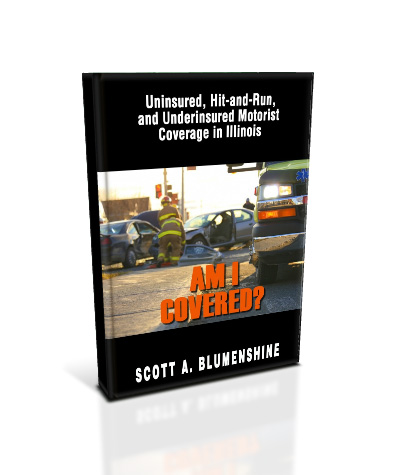
Yes, you can claim damages for PTSD. Illinois allows for the recovery of emotional damages. When a person has sustained injuries due to another’s actions, the person is entitled to recover all damages which are the natural and legal cause of the conduct.
When someone else’s negligence inflicts physical injury, Illinois courts allow claims for the mental conditions accompanying the injury. Also, under certain circumstances, you can be compensated for negligent infliction of emotional distress, even in the absence of a physical injury, and can also be classified as “emotional distress.”
Post Traumatic Stress Disorder – PTSD
PTSD (post-traumatic stress disorder) often follows a traumatic event involving serious injury. (American Psychiatric Association, 2000). Vehicle collisions can be traumatic. Despite road conditions, vehicle safety, and driver education improvements, over 3 million people are injured in motor vehicle accidents yearly. Many people develop post-traumatic stress symptoms that can become chronic.
Individuals who experience a serious motor vehicle accident (MVA) are at increased risk for psychological problems, particularly Post-traumatic Stress Disorder (PTSD). It is common to have troubling memories, feelings of anxiety, or sleep disturbance after a major accident. Psychological trauma is a type of damage that occurs as a result of a distressing event. And because the law allows for the recovery of damages for suffering and loss of normal life – PTSD damages can be recovered in a legal claim.
In some situations, the psychological trauma experienced is more serious than the physical injuries a person sustains in a car accident. Psychological trauma is often the result of an overwhelming amount of stress that exceeds one’s ability to cope or to integrate the emotions caused by the experience.
PTSD is a medical condition that causes a person difficulty in recovering after experiencing or witnessing a terrifying event, like death, threatened death, serious injury, and actual or threatened violence. PTSD interferes with a person’s ability to perform basic functions, such as housekeeping and work. The loss of normal life resulting from PTSD, if proven by the testimony of a psychologist or psychiatrist, can be an element of recoverable damages in a lawsuit.
Common PTSD symptoms
You may wonder if you or someone you care about has PTSD following a serious injury.
Below is a list of common PTSD symptoms:
- Terrifying memories, flashbacks, or nightmares;
- Unprovoked anger or a short fuse;
- Anxiety or feelings of being overwhelmed performing basic activities;
- Loss of concentration at work or in home life;
- Emotional numbing or little joy in situations you used to enjoy;
- Avoidance of people or situations you used to enjoy;
- Lack of trust of friends and family;
- Changes in temperament or personality or
- Changes in coping ability.
If you or someone you love are experiencing symptoms of PTSD, it is important to seek medical attention and consult with a doctor to get the right diagnosis and treatment. Treatment is available to help manage and overcome these feelings.
PTSD Following a Car Accident
Research shows that if you have been in a car accident, you are at risk of developing post-traumatic stress disorder. In fact, according to Very Well Mind, 9% of the general population who are in car accidents develop PTSD. That means that almost one out of 10 people who experience a car accident develop PTSD after the car accident.
Risk Factors for Developing PTSD After a Car Accident
The U.S. Centers for Disease Control and Prevention reports that more than 2.5 million Americans went to the emergency room, and almost 200,000 were then hospitalized following car accidents. Several risk factors have been found to increase the likelihood of developing PTSD following a car accident. They include:
- Having had a prior car accident or traumatic event;
- Having psychological difficulties before the car accident or traumatic event;
- Family history of psychological problems;
- Whether the car accident or trauma experienced was life-threatening;
- Losing someone in a car accident or trauma;
- The amount of support received from friends and family following the car accident or traumatic event and
- The person’s emotional response to a car accident or traumatic event – fear, helplessness, horror, guilt, or shame.
If you are experiencing any of these symptoms, seek prompt medical care from a mental health provider, psychologist, therapist, or social worker.
Recoverable Damages
The loss experienced by survivors of car accidents is tremendous. The CDC car accident injury statistics found the following:
- In 2014, Americans spent more than 1 million days in the hospital each year as a result of crash injuries;
- Crash injuries in 2018 caused more than $56 billion in lifetime medical and work loss costs. More than 75% of costs occur during the first 18 months following the crash injury, and
- In 2019, over 2.5 million people were treated in emergency rooms for injuries from vehicle crashes.
These costs and losses are called damages in the legal context. When you survive a car crash, you are entitled to damages to cover financial losses, costs, and medical fees associated with medical care and treatment. Additionally, costs for care and treatment for psychological or mental conditions, including anxiety, insomnia, PTSD, and other emotional ailments, as well as any medication prescribed, are recoverable
Can you sue for PTSD?
Yes, it is possible to sue for PTSD under certain circumstances. However, it is important to note that successfully suing for PTSD typically requires establishing negligence or intentional infliction of emotional distress. This can be challenging as cases often involve complex legal and medical considerations. Consulting with a qualified injury lawyer experienced in handling PTSD cases can help determine if you have a viable claim and guide you through the legal process.
Our PTSD Lawyers Actively Challenge Insurance Companies
Our Chicago PTSD lawyers aggressively challenge insurance companies that try to minimize your claim and discount your PTSD symptoms. We are always prepared to go to trial to obtain the best outcome for you. Our firm also handles first-party insurance coverage; we help you file a lawsuit against your insurance company if it acts in bad faith. Call or text (312) 766-1000 to schedule a confidential free consultation or email [email protected] today.
FAQs for PTSD Claims and Damages
What is PTSD (Post-Traumatic Stress Disorder)?
PTSD is a medical condition that arises after experiencing or witnessing a terrifying event, such as death, serious injury, or violence. It can interfere with a person’s daily functions, including work and household activities.
What are the common symptoms of PTSD?
Common symptoms include terrifying memories, flashbacks, nightmares, unprovoked anger, anxiety, loss of concentration, emotional numbness, avoidance of certain situations or people, and changes in temperament or personality.
How do I prove I have PTSD in a legal claim?
While testimony from a mental health professional such as a psychiatrist or psychologist can be very persuasive, it’s not mandatory. However, having an expert witness can significantly strengthen your claim.
Are car accident victims at risk of developing PTSD?
Yes, research indicates that individuals involved in serious motor vehicle accidents are at an increased risk of developing PTSD. Almost one out of 10 people who experience a car accident may develop PTSD.
What are the risk factors for developing PTSD after a traumatic event?
Some risk factors include having had a prior traumatic event, having psychological difficulties before the event, a family history of psychological problems, losing someone in the event, and the emotional response to the event, among others.
How does Blumenshine Law Group handle PTSD claims?
Blumenshine Law Group aggressively challenges insurance companies that try to minimize PTSD claims. They are prepared to go to trial to obtain the best outcome for clients and handle first-party insurance coverage.



